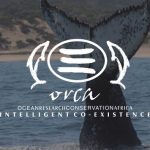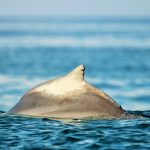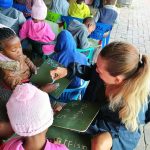The ORCA Foundation offers a unique learning experience for volunteers who are passionate about the marine environment. It will allow you to make valuable contributions to increased knowledge, awareness and conservation efforts while supporting applied marine research. As part of our comprehensive volunteer programme, participants regularly receive the opportunity to assist our research team and obtain hands-on participatory experience in boat-based and land-based fieldwork, as well as marine mammal stranding response and necropsy.
Our biologists study various marine top predator species in Plettenberg Bay, some of which are endangered (eg. Indian Ocean humpback dolphin and great white shark) and others that are more prolific (eg. Cape fur seal). They collaborate on various long-term monitoring projects focusing on cetacean photo-ID, abundance estimates and habitat use; seal population growth, seal diet and estuarine habitat use; seal-fisheries interactions and seal-shark interactions. Furthermore, our researchers are members of the Plettenberg Bay Marine Animal Stranding Response Network, a voluntary group acting on behalf of the Port Elizabeth Museum. They are appointed as agents of the museum to attend to marine mammal strandings, perform necropsies and collect samples for research purposes.
Things to be aware of
While assisting our biologists during boat-based fieldwork you may be required to move around the vessel whilst underway, sometimes in choppy conditions. Seasickness is a possibility and we suggest you take the necessary precautions if you are prone to this condition. Hiking to land-based observational sites and stranded marine mammal carcasses on remote beaches can be physically demanding and at times mentally challenging. However, we do realize that every volunteer has their own physical and mental capabilities, and therefore won’t expect you to venture beyond your limits.
Volunteers need to be prepared for regular last-minute changes in the research work schedule. It is important to understand that most of our research activities are highly weather dependent, especially boat-based fieldwork. Bad weather days will be used to catch up on data entry and other database tasks. Opportunistic research on whale and dolphin watching boat trips may also be cancelled or delayed depending on available space and last minute bookings. Marine mammal strandings often occur without warning. Events involving fresh carcasses or live animals ashore require immediate response and therefore take priority over all other research activities. When we receive a report of a marine animal ashore we often drop what we are doing and rush out to investigate as data and samples collected from stranded animals are very valuable in current research.


